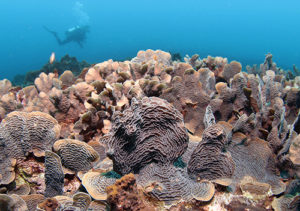By Jennifer Myton | Associate Program Director
In January 2018, we shared the results of Healthy Reefs Initiative (HRI)’s report on the status and trends of reef health in the Mesoamerican Reef (MAR). One of the key findings of the HRI Report Card is that the long-term dedication and collaboration of groups like CORAL in the Mesoamerican Reef (MAR) has paid off, leading to direct and measurable improvements in reef health.

Despite the fact that corals worldwide were hard-hit by mass bleaching over the last few years, 10 years of reef monitoring by HRI – from over 300 sites across 1000 kilometers and four countries – tells us that things are looking up in the MAR. The positive trend is attributed to stronger fisheries management and a significant increase in Marine Protected Areas (MPAs), which now cover 57% of the MAR. Legal protection and local management actions like no-fishing zones can lead to a measurable and positive shift in the number and size of fish. And when herbivorous fishes (like parrotfish and surgeonfish) thrive, coral reefs benefit because these fishes intensively feed on harmful seaweeds that outcompete and can overtake corals.
The results of the HRI Report Card are encouraging for two reasons: First, it tells us that there are indeed straightforward and concrete actions we can take to help corals adapt to the immediate challenges in their environment. Second, it tells us that the strategies that CORAL has been employing in our twelve years of engagement in the MAR are exactly the right things to be doing. We were proud to see in the HRI Report Card that reefs in West End on the island of Roatán are among the healthiest reefs in the entire MAR. For over 15 years, we have been working in West End, supporting and building the capacity of Roatán Marine Park (RMP), our long-time partners and co-managers of the Bay Islands National Marine Park.
Nowhere is the success of our approach more evident than in the recent declaration of the Tela Bay Marine Wildlife Refuge.

Thanks to the hard work of CORAL and partners, in early 2018 the Honduran national government approved the declaration of this new marine protected area, which covers 86,259 hectares of reefs and coastal ocean. Hiding in Tela Bay’s unassuming murky waters are some of the healthiest coral reefs in all of the Caribbean. Scientific surveys have shown that Tela Bay supports a staggering sixty-nine percent of live coral cover, which is more than three times the average coral cover in the Caribbean. The bay supports forty-six coral species, eighty-three fish species and eighteen types of marine habitats. It is also home to healthy populations of elkhorn and staghorn coral – a rare distinction given that these critically endangered species have declined by eighty percent over the past thirty years. The refuge will not only ensure the future of this stunning ecosystem, it will also enable the coral reefs to continue to provide food and economic opportunities to the thirteen coastal communities that live on its shores.
As part of our efforts to protect the unique reefs of Tela Bay, CORAL also played a key role in the declaration of Honduras’ first coastal managed-access fishery in Laguna de los Micos – a lagoon near Tela Bay where juvenile reef fishes grow up. This managed-access fishery creates an important model for fisheries reform in the southern MAR. We’re continuing our work with local partners to ensure protection of this marine treasure through projects that create win-wins for people and reefs, such as supporting alternative livelihoods to reduce unsustainable fishing in Tela Bay and the neighboring Laguna de los Micos.

Amid the often gloomy messages about the fate of coral reefs, we feel it’s important to acknowledge and celebrate the hard-earned conservation successes by dedicated communities of people who care deeply about the future of reefs – from non-profits and the dive community to governments and local fishing communities. We look forward to seeing what more we can accomplish together!
Project reports on GlobalGiving are posted directly to globalgiving.org by Project Leaders as they are completed, generally every 3-4 months. To protect the integrity of these documents, GlobalGiving does not alter them; therefore you may find some language or formatting issues.
If you donate to this project or have donated to this project, you can receive an email when this project posts a report. You can also subscribe for reports without donating.
Support this important cause by creating a personalized fundraising page.
Start a Fundraiser